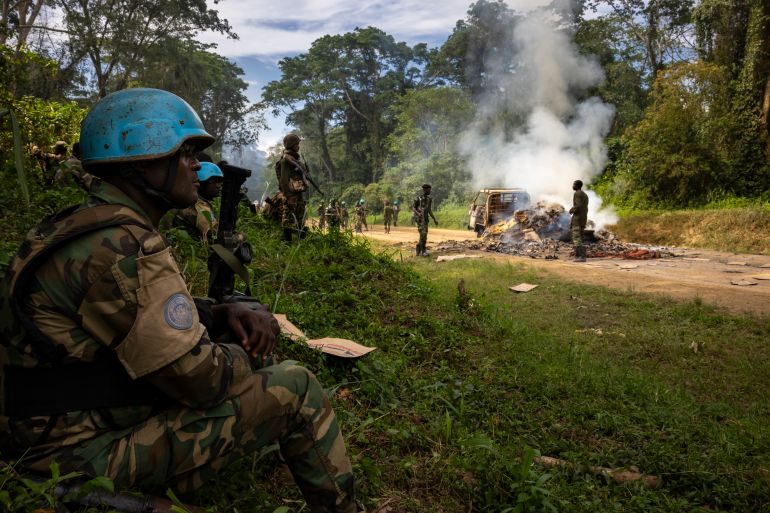At least 36 killed in eastern DR Congo attack
Officials say attack targeted the village of Mukondi, about 30km (19 miles) south of the city of Beni in North Kivu province, an area rife with rebel activity.

At least 36 people were killed during an overnight attack on a village in the eastern Democratic Republic of the Congo.
A local official and the head of a civil society group said on Thursday the assailants were believed to be members of the Allied Democratic Forces (ADF) – a Ugandan armed group based in eastern DRC that has pledged allegiance to ISIL (ISIS) and wages frequent deadly raids on villages.
Keep reading
list of 4 itemsThe cost of the Democratic Republic of the Congo’s war with M23
Rwanda accuses DR Congo soldiers of attack on army border post
East African leaders urge ceasefire in eastern DR Congo
The attack targeted the village of Mukondi, 30km (19 miles) south of the city of Beni in North Kivu province, an area plagued with rebel activity and which has been under military administration since 2021 in an attempt to restore order.
Provincial governor Carly Nzanzu Kasivita said on Twitter at least 36 people had been killed in the attack, which began on Wednesday evening.
In the night from March 8 to March 9, armed militiamen from the #Mwalika valley set fire to the village of #Mukondi (#Beni terr., North #Kivu). They killed at least 30 people with machettes. Over 10 wounded are currently in #Kalunguta health centre. The #ADF are suspected. #DRC pic.twitter.com/HAZzZ7kvl2
— Baromètre sécuritaire du Kivu (@KivuSecurity) March 9, 2023
The head of a local civil society group, Mumbere Limbadu Arsene, gave a provisional death toll of 44, including women, children and the elderly, and said several villagers were still missing.
“The modus operandi suggests it was the ADF because no bullets were fired,” he told Reuters news agency via telephone, adding some victims died trapped in their homes after attackers set them ablaze.
The ADF often wages attacks using machetes and hatchets.
A local army spokesperson, Antony Mwalushayi, confirmed there had been an attack but did not give a death toll.
Kakuke Kilalo Emmanuel, a resident of the nearby village of Kalunguta, said he went to Mukondi on Wednesday but turned back after he saw people in a state of panic as the attack was unfolding.
Many Kalunguta residents have fled out of fear for their safety, he added.
Civilian massacres
The ADF was formed in 1995 by a coalition of rebel forces – including the Uganda Muslim Liberation Army and the National Army for the Liberation of Uganda – to fight against the Yoweri Museveni administration.
It is among the most violent groups in the DRC, and has been accused of a string of bomb attacks and civilian massacres. According to the Catholic Church in the country, the ADF has killed about 6,000 civilians since 2013.
US-based monitor the Kivu Security Tracker blames the group for more than 1,200 deaths in the Beni area alone since 2017.
The DRC government declared a state of siege in North Kivu and neighbouring Ituri province in 2021 in an attempt to stem rampant violence in the country’s vast mineral-rich east.
But the killings and rebel activity have not shown any sign of abating.